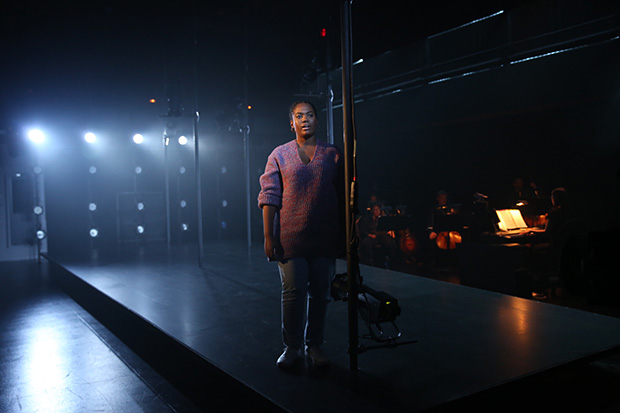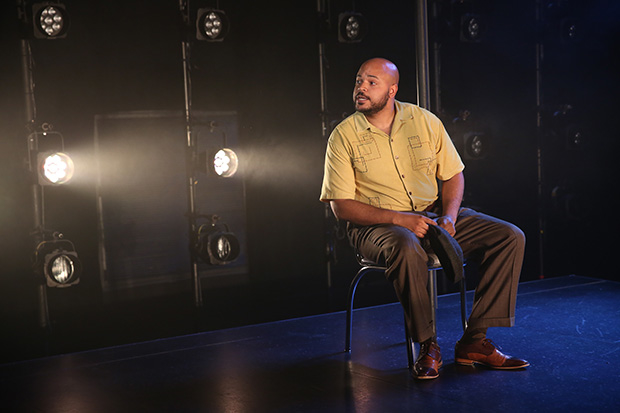A Musical Theater Philanthropist Turns Composer in Wishy-Washy Broadbend, Arkansas
Two musical one-acts are presented by Transport Group.

(© Carol Rosegg)
From past experiences, I feel safe to say that evenings of interconnected one-acts rarely leave me feeling satisfied. It comes down to being able to play favorites. I always walk out having enjoyed one over another, as opposed to being able to look at the piece as a whole. The same holds true for Broadbend, Arkansas, a pair of musical monologues commissioned by Premieres and the Public Theater, and now receiving a full production by Transport Group at the Duke on 42nd Street. The subject is very timely, and both works are delicate. But inevitably, I liked the second and disliked the first.
Ellen Fitzhugh (book and lyrics) and Ted Shen (score) pen the first half, titled Just One Q. Set in 1961, it tells the story of Benny (Justin Cunningham), an African-American nursing home orderly who must choose between following the Freedom Riders or going home to his toddler twin daughters.
There's a lot to follow in this 40-minute segment, which has a surprisingly detailed plot to unpack for such a short running time (a bit too detailed for Cunningham to effectively pull off) and an artificiality it cannot shake. Just One Q rings false with its unconvincing storytelling and a performer who was still getting a grasp of the material at the performance I attended.
The second half, set in 1988, is far more convincing. Penned by Shen (score) and Harrison David Rivers (book and lyrics), the piece takes its name from its title character, Benny's now-grown daughter Ruby (Danyel Fulton). In Ruby, her 15-year-old son is in the hospital after getting roughed up by cops in a manner similar to the one that killed her father 27 years ago. She must come to terms with her father's passing while also dealing with the generational traumas that come with being black in America.

(© Carol Rosegg)
Fulton's wonderfully affecting performance carries Ruby to the finish line. Her strong interior core gives way to an uneasy, nervous exterior. You can see the desperation in the way she carries her proud self, and you can hear it in her voice, too. Shen gives her notes to sing that are so high they don't even seem real, and Fulton simultaneously delivers them with incredible finesse and control, while making them seem like howls of real pain. I also preferred Ruby because of the stealthy and economic storytelling of Rivers's book. It didn't take too many diversions, it didn't present too many strands of plot, and it felt believable.
As for the score: Well, Shen is a noted theatrical philanthropist. His grants have helped fund a wide range of contemporary productions including The Light in the Piazza and Fun Home, with a particular concentration on Sondheim (37 shows, including concerts and revivals). This is his second musical, and it's clear that Shen is still in a nascent phase of emulating those he admires instead of creating his own distinctive sound. No matter how much Broadbend, Arkansas tonally borrows from "The Little Things You Do Together" and "Good Thing Going," Shen is no Sondheim, and the music he has created is strangely jaunty for such a difficult subject.
As directed by Jack Cummings III, Broadbend, Arkansas is a barebones experience, and the design can best be described as unremarkable. There is no set beyond a few chairs (Dane Laffrey is billed as a "consultant") and Peiyi Wong's costumes are strangely contemporary. For such a small house, it was surprising that Walter Trarbach would amplify the two actors so much, but at least it allows us to hear the six-piece orchestra with clarity. I liked Jen Schriever's lighting, which gave a haunting starkness to the actors' faces. The show needs a lot more of that haunting nature to really be successful.







